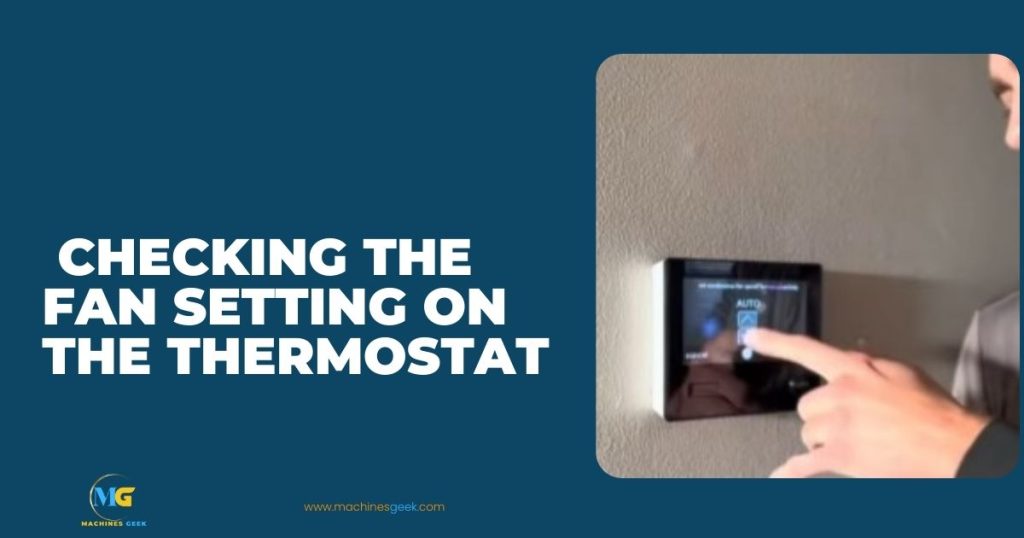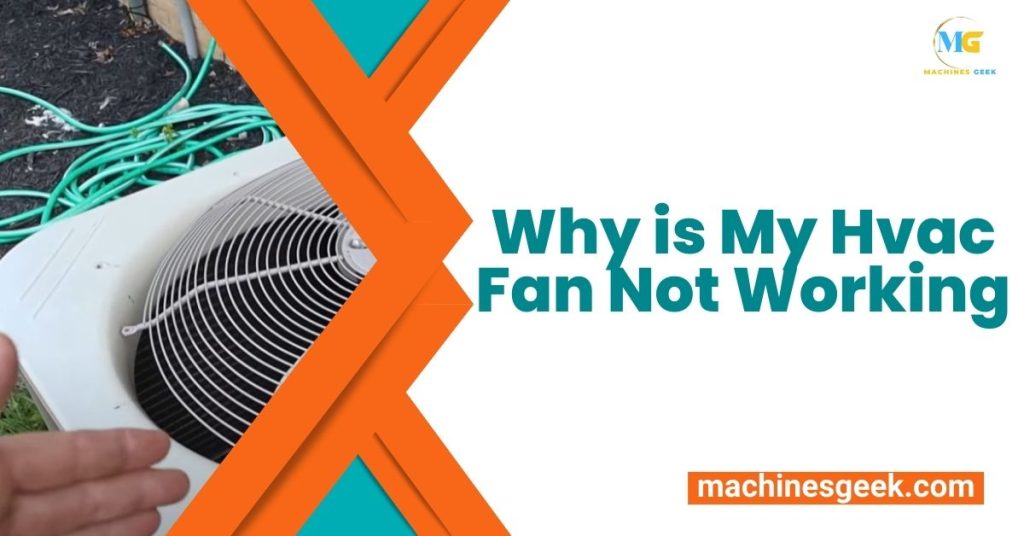Why is My Hvac Fan Not Working? Your HVAC fan may not be working due to a faulty motor or a tripped circuit breaker. When the motor is damaged or the circuit breaker is switched off, the fan fails to function.
We will explore the possible causes and suggest troubleshooting steps to get your HVAC fan up and running again. The HVAC fan plays a crucial role in circulating air throughout your home, ensuring a comfortable indoor climate. However, it can be quite frustrating when you notice that your HVAC fan is not working.
This issue can lead to poor air circulation, reduced heating or cooling efficiency, and discomfort in your living space. Understanding the underlying causes of a malfunctioning HVAC fan is essential to troubleshoot the problem effectively. We will discuss the common reasons why your HVAC fan may not be working and provide practical tips to resolve the issue promptly.
Common Causes Of Hvac Fan Failure
Common causes of HVAC fan failure can be categorized into various motor issues, electrical problems, thermostat malfunctions, and sensor inaccuracies. Motor issues may include worn-out motor bearings, faulty motor capacitors, and burnt-out motor windings. These problems can lead to the fan not functioning properly or not turning on at all.
Electrical problems such as tripped circuit breakers, blown fuses, and faulty fan relays can also prevent the HVAC fan from working. These issues may require professional assistance to fix.
In some cases, a faulty thermostat or incorrect fan settings can cause the HVAC fan to malfunction. This could be due to the fan being set to “auto” instead of “on” or vice versa. Additionally, a faulty thermostat sensor may provide inaccurate temperature readings to the HVAC system, causing the fan to malfunction.
| Motor Issues | Electrical Problems | Thermostat Malfunction |
|---|---|---|
| Worn-out Motor Bearings | Tripped Circuit Breaker | Incorrect Fan Setting |
| Faulty Motor Capacitor | Blown Fuse | Faulty Thermostat Sensor |
| Burnt-out Motor Windings | Faulty Fan Relay |
How To Address Motor Issues
Replacing Worn-out Motor Bearings: One of the reasons why your HVAC fan may not be working is due to damaged bearings. Signs of worn-out bearings include unusual noises, reduced airflow, and the fan not spinning. To address this issue, you will need to replace the damaged bearings with new ones. Follow these steps:
- Step 1: Disconnect power to the HVAC system to ensure safety.
- Step 2: Remove the fan motor cover to access the motor assembly.
- Step 3: Locate the worn-out bearings and carefully remove them using suitable tools.
- Step 4: Install the new bearings into the motor assembly, ensuring a secure fit.
- Step 5: Reassemble the fan motor cover.
- Step 6: Restore power to the HVAC system and test the fan to ensure proper functionality.
Troubleshooting Faulty Motor Capacitors: Another common issue that can cause the HVAC fan to stop working is a faulty motor capacitor. Symptoms of a bad capacitor include the fan not starting, intermittent operation, or the fan running at a slower speed. To troubleshoot and potentially fix this problem:
- Step 1: Turn off the power to the HVAC unit to avoid electrical hazards.
- Step 2: Identify the motor capacitor, usually cylindrical in shape, located near the fan motor.
- Step 3: Examine the capacitor for any signs of bulging, leaking, or damage.
- Step 4: Test the capacitance using a multimeter to determine if it falls within the specified range.
- Step 5: If the capacitor is faulty, replace it with a new one of the same capacitance rating.
- Step 6: Restore power to the HVAC system and check if the fan now operates correctly.
Dealing with Burnt-out Motor Windings: Burnt motor windings can also prevent the HVAC fan from working. Signs of burnt windings include a burning smell, excessive heat, or the fan not starting at all. In such cases, repairing the motor windings might not be practical, and replacement options should be considered. Contact a professional HVAC technician to assess the situation and provide guidance on the most suitable course of action.
Resolving Electrical Problems
| Identifying Tripped Breakers | Steps to Reset Breakers |
| Check the circuit breaker panel and look for any breakers that are in the “tripped” position. A tripped breaker will be in-between the on and off position. | To reset a tripped breaker, flip it all the way to the “off” position and then back to the “on” position. This should restore power to the HVAC fan. |
| Identifying Blown Fuses | Steps to Replace Fuses |
| Inspect the fuse box for any fuses that are visibly damaged or have a broken wire inside. | To replace a blown fuse, remove the old fuse and insert a new one of the same amperage rating. Make sure to follow the manufacturer’s instructions for replacing fuses. |
| Symptoms of a Bad Relay | Steps to Test and Replace a Relay |
| Common symptoms of a faulty fan relay include the HVAC fan not turning on at all, or the fan turning on and off intermittently. | To test a relay, you will need a multimeter to measure for continuity across the relay terminals. If a relay fails the continuity test, it should be replaced with a new one. |
Fixing Thermostat Malfunctions

One common reason for HVAC fan malfunction is thermostat malfunctions. Checking the fan setting on the thermostat is the first step to troubleshoot this issue. Make sure the fan setting is set to the correct mode for the season. During the warmer months, the fan should be set to the “auto” mode, while in the colder months, the “on” mode keeps the air circulating. Adjusting the fan setting according to the season ensures optimal performance.
An inspecting the thermostat sensor is the next step to identify any malfunctions. Signs of a sensor malfunction include inaccurate temperature readings or failure to turn on/off the HVAC system. Cleaning or replacing the sensor, if necessary, can help fix the issue. A dirty or faulty sensor can disrupt the fan’s functioning.
Additional Troubleshooting Tips
Verifying the Power Supply: If you are facing issues with your HVAC fan not working, the first step is to check the power supply. Ensure that the circuit breaker or fuse connected to the fan is not tripped or blown. If it is, consult a professional electrician to fix the electrical problem.
Cleaning the Fan and Vents: Another troubleshooting tip involves cleaning the fan and vents. Over time, dust and debris can accumulate, hindering the fan’s performance. Regular cleaning is important to maintain optimal airflow and prevent any further problems.
Importance of Regular Cleaning: Regular cleaning not only enhances the performance of the fan but also promotes better indoor air quality. It prevents the accumulation of allergens and pollutants, ensuring a healthier living environment.
DIY Cleaning Methods: While you can perform basic cleaning yourself, it’s important to follow proper safety precautions. Ensure that the system is turned off and use a soft cloth or brush to gently remove dust and debris. Avoid using harsh chemicals that may damage the fan.
Contacting HVAC Professionals: If the troubleshooting tips mentioned above do not resolve the issue, it’s time to contact HVAC professionals. They have the knowledge, expertise, and tools to diagnose and fix complex HVAC problems.
Indications for Professional Assistance: If you notice any unusual noises, burning smells, or any other signs of malfunctioning apart from the fan not working, it’s crucial to seek professional assistance. Ignoring these indications may lead to more significant problems and costly repairs in the future.
Choosing a Reliable HVAC Technician: When selecting an HVAC technician, it’s essential to choose someone reliable and experienced. Look for certifications, customer reviews, and recommendations to ensure quality service and peace of mind.
Frequently Asked Questions
Why Is My Hvac Fan Not Working?
The HVAC fan may not be working due to a faulty motor, a blown fuse, or a malfunctioning thermostat.
What Are The Common Causes Of Hvac Fan Failure?
Common causes of HVAC fan failure include a faulty capacitor, a worn-out fan belt, or a blocked air filter.
How Can I Troubleshoot My Hvac Fan Not Working?
To troubleshoot your HVAC fan, check the thermostat settings, inspect the circuit breaker, and ensure the air filter is clean.
Conclusion
If your HVAC fan is not working, it can be a cause of concern as it can lead to discomfort and poor air circulation in your home. By understanding common issues such as faulty wiring, motor problems, or thermostat malfunctions, you can troubleshoot and resolve the problem.
Regular maintenance and timely professional assistance can help prevent future fan malfunction and ensure efficient HVAC system performance. Stay proactive and keep your HVAC fan running smoothly for optimal comfort and air quality.








